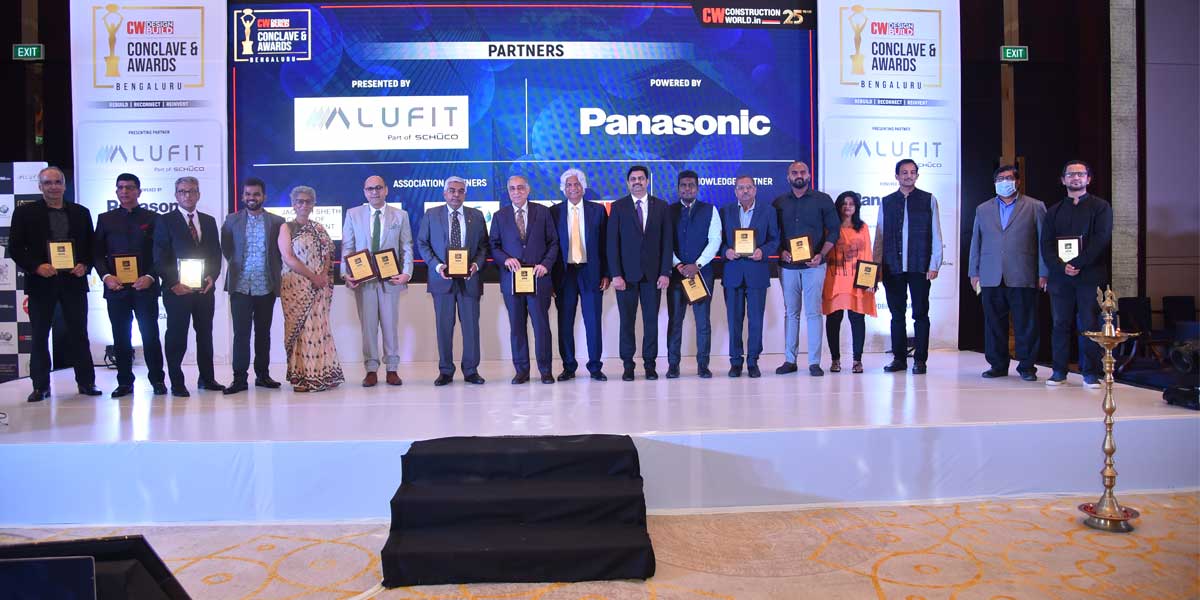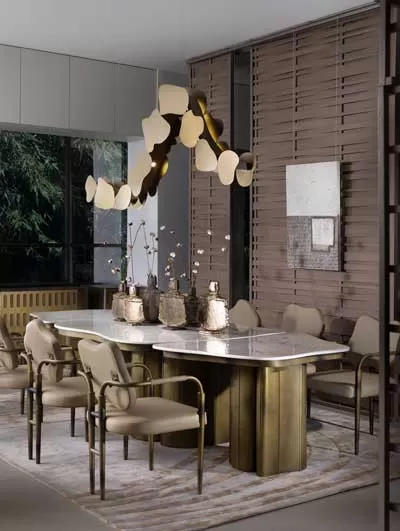On a multicity tour to celebrate its silver jubilee year, CW travelled to Bengaluru to felicitate the ‘Stalwarts of the South’ who have contributed to the overall development of the city.
The third largest city in India, Bengaluru was once called the Garden City because of its profusion of green spaces. Over the years, the city has transformed into a bustling IT centre and has now earned the distinction of being India’s Silicon Valley.
The developer and architect fraternity have played a key role in making Bengaluru the city it is today. To appreciate their dedication and contribution to transforming the city, CW took the initiative through the CW Design Build Conclave & Awards to felicitate these Stalwarts of the South in a grand event organised at Conrad Bengaluru on December 3, 2021.
India's largest circulated construction magazine with over 250,000 readers every month, CW is celebrating its silver jubilee year by undertaking a journey to various cities to felicitate stalwarts who have contributed towards strengthening our built environment.
After a successful event in Ahmedabad in October 2021, Bengaluru was the second city on our journey.
An event to remember
The evening began with a lamp-lighting ceremony by Pratap Padode, Founder, CW, and Founder & President, First Construction Council; Falguni Padode, Group Managing Editor & Co-Founder, CW; Farook Mohamad, Chairman Emeritus, Bengaluru Realtors Association - India (BRAI) and Chairman and Managing Director, Silverline Realty; Shrikant Channal, Chairman, Association of Consulting Civil Engineers (ACCE)- Bengaluru Chapter; and Pankaj Keswani, Managing Director, Alufit.
In his welcome address, Padode said, “Over the years, Bengaluru has seen a major transformation and today is the most preferred option for NRIs. The city is ahead of the rest in terms of development and improved infrastructure.” Later, he felicitated Mohamad and Channal with mementos.
Stimulating discussions
The first panel discussion titled ‘Bengaluru Real Estate Set to Boom’ was a highly interactive session focused on the city’s real estate and a vision for the future. Moderator Indranil Basu, Managing Director, Project Management, South India, Colliers, opened the discussion by highlighting Bengaluru’s growth and how the city is faring better than the rest of India – it has leased out around 6.3 million sq ft from January to September 2021, around 31 per cent, which is the highest in the country. Other panellists included Mohamad; Syed Beary, CMD, Beary Group and Chairman – Bengaluru Chapter, Indian Green Building Council (IGBC); Abhishek Kapoor, CEO, Puravankara; and Sunil Kurup, Head Key Account, Panasonic India.
Offering an insight into the city’s real-estate market, Mohamad said, “Overall, the Bengaluru market seems to be very bullish. The highest amounts of sales have taken place here, barring Mumbai and Hyderabad. One thing that has surprised me is that people want to buy second homes and holiday homes. There has been a tremendous spurt in high-value sales, priced between Rs 25 crore and Rs 30 crore, unheard of in the city till about three to five years ago.”
According to Kapoor, “The market is growing and the best part about Bengaluru right now is the infrastructure development. When the metro stations get operational, the city will be accessible from all directions. This will lead to further development. North Bengaluru and Whitefield will continue to be the key markets.”
Speaking about the hybrid model and how things have changed in the commercial sector, Kurup said, “We did see a sharp decline in terms of office sales in the recent past due to the pandemic but office spaces are evolving in Bengaluru and Hyderabad. The IT sector has started refurbishing its workspaces, which is a very positive sign.”
For his part, Beary said, “IGBC, which started in 2002 with 20,000 sq ft of green footprint in India, has nearly 8 billion sq ft today. We are next to the US and Canada. Today, we have more than 6,000 projects that are green-rated. We need to adapt green architecture and sustainability for a better future.”
“Bengaluru has seen tremendous growth due to infrastructure development, especially connectivity through metro, and businesses are going to grow in a big way,” continued Kapoor. “People are making the decision to buy a home, which is a fundamental shift in thinking, as people previously preferred living on rent. The second noticeable shift is that buyers are looking for bigger homes, as now there is the trend of working from home. Buyers are demanding technology and well-being, which is a new-age expectation.”
And Kurup added, “We have seen the `new normal’, where there was a decline in demand for office space. But on the other hand, IT companies like Infosys are refurbishing their offices in Bengaluru and Hyderabad. Office space is evolving; electrical and electronics products are becoming energy-efficient. Other factors like energy management, space management and solar panel automation are more in demand.”
The discussion ended on a very positive note with the panellists concluding that Bengaluru would further evolve into a dream paradise for buyers in the coming years.
Kurup made an informative presentation on how Panasonic has grown as a company, adding various verticals to its portfolio.
This was followed by the next panel discussion, ‘Rethinking Architectural Methodology’, which focused on the need to improve architectural methodology in the pursuit of better work and whether Lean architecture is the key to Design-Build success in India.
This session was moderated by Sunil Shelar, Principal Architect, SSA. A practising architect since 1983, he worked with world-renowned architect Charles Correa from 1983 to 1990 and established his independent practice in Bengaluru in 1990.
The panellists included Chitra Vishwanath, Principal Architect and Managing Director, Biome Environmental Solutions Pvt Ltd; Ravindranath BV, Chief Consultant, Ravindranath & Associates; Dr Ajit Sabnis, Principal Consultant, ASP-SDI Sustainability Auditing Consultants; Dhiraj Chilakapaty, Associate Architect, Venkataramanan Associates; Sunil Kurup, Head Key Account, Panasonic India and Rajesh Kumar Das, Principal & Director of Interior Design, Rubenius.
Shelar opened the discussion addressing the need for innovation and the use of new-age materials. “Innovation should not be restricted to technology and materials,” said Dr Sabnis. “It has to be an overall process –a paradigm shift in design thinking. Previously, we worked on linear philosophy and now we are working on the circular economy. We need to adopt the BAMB [buildings as material banks] principle where we don't have to worry about what to do with the materials after completion of the project. We should think more on how to use buildings as material banks, which means retrieval and reuse of the materials is possible to an extent.”
“Contemporary Indian cities are now in a constant state of flux; cities are supposed to exist in the equilibrium of society, economy and environmental needs,” observed Chilakapaty. “Talk about Apple, Microsoft or Google, everyone is now talking about design thinking. But it's something we architects are already trained about. We have always been trained to address user needs and come up with inventive solutions. So I think this is something we should delve into further and look at more innovative solutions and how to address them with the developing needs of cities.”
Laying emphasis on methodology and digitalisation, Das said, “When it comes to architectural methodologies, I think there is still a big gap that needs to be plugged in terms of digitalising the whole working style used by various architects in India.” Vishwanath added, “Words like circularity, AI, virtual reality, BAMB and IoT [Internet of Things] are being used in our day-to-day lingo. We all have seen COP26; everybody was disheartened by the way the countries negotiated. But still, we could take solace in the fact that we are no longer in the ozone hole. Somewhere down the line, companies and countries came together and decided to remove CFCs from their cooling system to save the world. So, innovations have to be a huge action. Innovations in the future will be mitigating and creating resilience with respect to climate change and it cannot be just for the anthropogenic world but to design and create for the whole ecosystem. That's where the future of innovation lies.”
For his part, Ravindranath BV said, “Every builder or project management company or even a consultant should adopt smart approaches. 3D technology will definitely change the construction industry, especially in the mass housing sector. Lean construction is also a way forward.” Shelar concluded the discussion by posing some questions to all stakeholders: “Where do all architectural methodologies lead us? Or are we going to learn from this emerging landscape from whatever innovations we have? If we have an option to build a city from scratch, what would you like to see or experience differently?”
Followed by the panel discussion, Pankaj Keswani gave an outstanding presentation on the journey and landmark projects of Alufit.
The awards!
The highlight of the gala event, of course, was the awards ceremony where the Stalwarts of the South were honoured. Here is the list of winners (in alphabetical order):
Architecture Paradigm
Biome Environmental Solutions
Brigade Group
Cadence Architects
Crest Architects
Embassy Group
Gayathri & Namith Architects
Kamat & Rozario Architecture
Mistry Architects
Prestige Estates & Projects
Provident Housing
Puravankara
Sattva Group
Shriram Properties
Sobha
Venkataramanan Associates
The event came to a close with a special vote of thanks from Falguni Padode, Group Managing Editor & Co-Founder, CW.
The event was supported by Presenting Partner Alufit and Powered by Panasonic with Knowledge Partner Housing.com. Supporting Partners: Bengaluru Realtors Association - India, Builders Association of India, International Real Estate Federation – FIABCI - India, Association of Consulting Civil Engineers, and Jagdish Sheth School of Management.


















